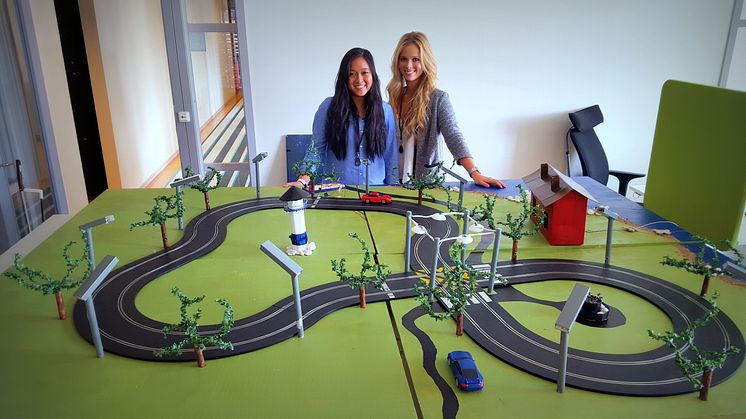
News -
New IoT traffic light system will save energy and increase traffic awareness on the Swedish roads
Sigma Technology in Gothenburg and the Internet of Things and People research center (IoTaP) at Malmö University have developed an experimental demo project presenting a new traffic light system. The goal was to create smart street lights that contribute to saving energy and increasing traffic safety by the illumination of following vehicles.
Many traffic accidents occur during the dark hours as motorists have a hard time detecting pedestrians and cyclists, and as wildlife crosses the roads. Even though the streets are equipped with lamp posts, it is impossible to reach the same level of visibility as during the day. Light pollution and electricity bills are other factors to consider too.
“One interesting challenge in designing for the Internet of Things is emergent configurations, i.e., temporary assemblies of devices acting as a coherent system from the user's point of view,” says Jonas Löwgren, Professor of Interaction Design at Malmö University. “As an initial experiment in our ECOS research project, we designed and prototyped a new traffic light system to provide energy-efficient light and increase traffic awareness.”
The aim of the demo project was to use lamp posts to inform drivers about the presence of other traffic participants and to decrease light pollution, thereby saving energy.
Mikael Thonell, supervisor of the research project at Sigma Technology Development in Gothenburg, explains:
“Today’s traffic light systems have a constant level of light on during preprogrammed hours even when no one is there. The idea of this project was to use a lower light level when there is no one around and to increase it when someone appears. This approach allows to both save energy and help drivers notice someone approaching more easily.”
The number of lit up lamp posts changes dynamically depending on the speed of the moving car. The system can be supplemented in many ways, for example, by using different levels of intensity or colors depending on the traffic factors.
“The prototype was built as a miniature using Scalextric cars. The lamp posts are connected in scalable ring architecture; each of them runs the same modular code for sensing vehicles, communicating with neighbors, and controlling its lights,” adds Jonas.
The demo project is now completed, and you can review the highlights in a short video:
The ECOS Street Lights Experiment from Jonas Löwgren on Vimeo.
The “Smart Street Lights” project was performed by Thi Hellqvist and Emmie Johansson, interns at Sigma Technology, collaborating with the research center IoTaP at Malmö University and Sigma Technology Development team from Gothenburg office.
“Sigma Technology supports a sustainable future through education, R&D, and social responsibility. We conduct research projects in different areas including product information, information quality, and internet of things,” says Carl Vikingsson, CEO at Sigma Technology Group. “We cooperate with many technical universities all over the world where we drive innovation and development through exchange programs, internships, and voluntary projects. We believe that all of these activities contribute to the creation of a smarter society and a better tomorrow.”
For more information about the project and the smart street lights concept, please contact Mikael Thonell (mikael.thonell@sigmatechnology.se).
